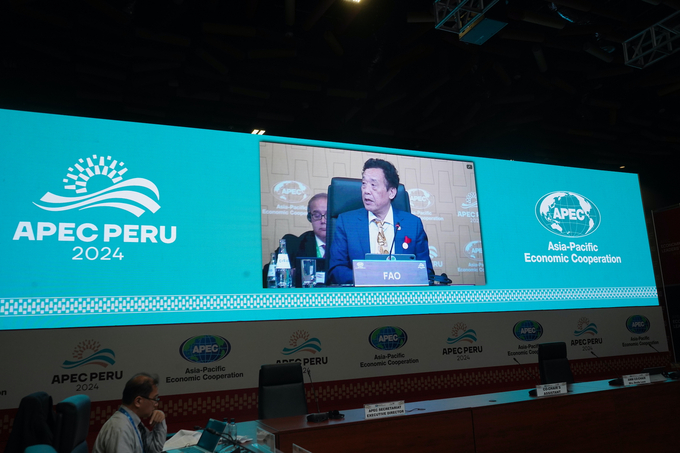May 15, 2025 | 20:29 GMT +7
May 15, 2025 | 20:29 GMT +7
Hotline: 0913.378.918
May 15, 2025 | 20:29 GMT +7
Hotline: 0913.378.918

FAO Director-General QU Dongyu participates in the 2024 APEC Leaders Dialogue.
The Asia-Pacific Economic Cooperation (APEC) should scale up investments in expanding social protection systems, sharing best practices, promoting healthy diets, supporting smallholder farmers, enhancing agriculture resilience and promoting gender equality and socio-economic inclusion, the Director-General of the Food and Agriculture Organization of the United Nations (FAO), QU Dongyu, urged on Friday.
Speaking at the inter-governmental forum’s Summit in Peru, Qu highlighted that APEC has a critical role to play in enhancing economic cooperation and building inclusive, resilient and sustainable growth that reaches all communities, urging its members to seek solutions to address the escalating global challenges of poverty, hunger and climate change.
"The world is critically off-track to achieve the Sustainable Development Goals (SDGs) by 2030," Qu declared, emphasizing the urgent need for collaborative action. He highlighted the interconnectedness of the challenges, noting how the pandemic, conflicts, economic downturns, and the climate crisis have created a "poverty multiplier" effect, pushing millions into extreme poverty and hunger.
The Director-General lauded the G20 Global Alliance Against Hunger and Poverty as a critical step to bring food security and poverty reduction back to the center of global discussions, and urged APEC members to support it and similar initiatives.
"We must seek solutions, and platforms like the World Food Forum unite all partners in building more efficient, more inclusive, more resilient and more sustainable agrifood systems", he said.
The Director-General also stressed the importance of addressing the needs of the most vulnerable populations, particularly those in rural areas who are disproportionately affected by poverty, hunger, and climate change. He advocated for building "cross-regional bridges" to connect these communities with markets, financial services, and essential resources.
In this context, Qu emphasized the transformative potential of digital technologies in empowering smallholder farmers, enabling them to improve their competitive advantage and gain a greater share of the value chain for their products and services.
Recognizing the significant funding gap for food security and nutrition initiatives, he called on APEC members to increase financing and target it effectively to address the root causes of hunger and poverty.
"By prioritizing agrifood systems and focusing on those who are most vulnerable, APEC can help build a future for shared prosperity and an inclusive world", the Director-General said.
He urged APEC members to work together to achieve the "Four Betters" at the core of FAO’s Strategic Network – better production, better nutrition, a better environment, and a better life, leaving no one behind.
(FAO)

(VAN) Fourth most important food crop in peril as Latin America and Caribbean suffer from slow-onset climate disaster.

(VAN) Shifting market dynamics and the noise around new legislation has propelled Trouw Nutrition’s research around early life nutrition in poultry. Today, it continues to be a key area of research.

(VAN) India is concerned about its food security and the livelihoods of its farmers if more US food imports are allowed.

(VAN) FAO's Director-General emphasises the need to work together to transform agrifood systems.

(VAN) Europe is facing its worst outbreak of foot-and-mouth since the start of the century.

(VAN) The central authorities, in early April, released a 10-year plan for rural vitalization.

(VAN) Viterra marked a significant milestone in its carbon measurement program in Argentina, called Ígaris, reaching 1 million soybean hectares measured.